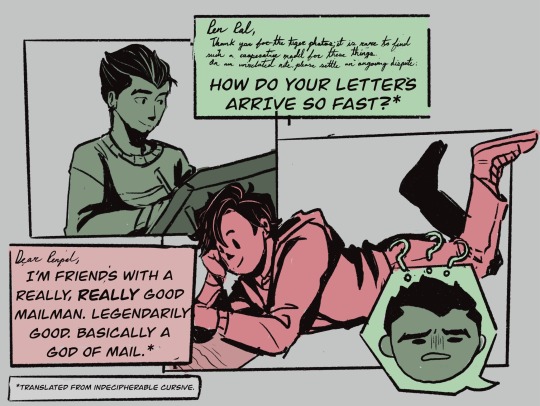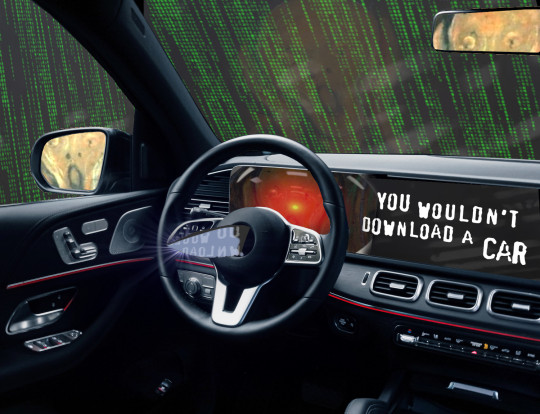#computer accessibility
Explore tagged Tumblr posts
Text
I seem to remember one of my mutuals using type-to-speech software and having a long post about various computer accessibility programs/options. Does thing ring any bells for any of you? Or are you not the person I'm thinking of but have suggestions anyway? Because my brain is glitching more than usual but I have shit to do, so I need to start figuring out how to get work done when my limbs won't cooperate.
9 notes
·
View notes
Text
Trying to Use @#$% Windows...
The interface defaults to Segeo UI. Segoe UI hurts my eyes. Increasing font scaling, increasing screen scaling, and reducing screen resolution aren't enough. The settings do not include an option to switch to another less-painful font. I can't get a regedit fix to work. I have to install other software to read the fucking screen.
There is way too much animation. The settings allow users to turn off this animation. There is still way too much animation.
The system does not support my mouse. The manufacturer provides an app for their mice. The app does not support my mouse.
The system cannot read many of my disks.
I install wls2 so I can get something to work. I install Cinnamon so I can get a readable, accessible alternative to Windows Masochism Explorer. I cannot get it to run. I try the Disks app. I cannot get wls to recognize the disk I've plugged in, because Windows doesn't recognize it.
I thought WINE was frustrating.
0 notes
Text
this is a permanent list of palestinians with vetted fundraisers that have reached out to me to boost them, if you've reached out to me and you're not on here please message me again. this list will be linked in my about page and regularly updated.
Rescue Mahmoud's Family: A Call to Escape Gaza's Devastation @mahmoodeltibi - vetted by el-shab-hussein, family of 15. €10,261 raised of €60,000 goal
Standing with a Family Escaping the Horrors of War in Gaza. Help Tamer get his family of 4 out of Gaza @tameraldeeb - Vetted by ibtisams, 90-ghost, el-shab-hussein, as well as being #191 on the vetted fundraisers google doc. €17,887 raised of €40,000 goal
Help Dina and her children survive through the war. Dina is a widowed mother with a 7 year old, a 5 year old and a newborn trying to reach safety. @dina179 - vetted by ibtisams. $4,146 CAD raised of $20,000 goal
Yousef Hussein is trying to get his nieces out of gaza after the death of their mother and father. boosted by 90-ghost. $8,412 raised of $50,000 goal
shahed @shahednhall is trying to get her family (her sisters are sick with hepatitis C) through rafah crossing in the next weeks opening period. she is number 224 on the vetted list of vetted fundraisers by nabulsi and el-shab-hussein. $17,267 raised of $50,000 goal
Ola's Family Call for your Support Amid Crisis @olagaza. Number #205 on the vetted list of fundraisers $19,195 raised of $50,000 target
#i need to update this later im really sorry but i dont have much more access to a computer#i will be adding many more people and reblogging regularly#save#palestine#gaza#all eyes on rafah#gaza strip#masterlist
11K notes
·
View notes
Text
Look, there's a lot to be said about the contemporary gaming industry's preoccupation with graphics performance, but "no video game needs to run at higher than thirty frames per second" – which is something I've seen come up in a couple of recent trending posts – isn't a terribly supportable assertion.
The notion that sixty frames per second ought to be a baseline performance target isn't a modern one. Most NES games ran at sixty frames per second. This was in 1983 – we're talking about a system with two kilobytes of RAM, and even then, sixty frames per second was considered the gold standard. There's a good reason for that, too: if you go much lower, rapidly moving backgrounds start to give a lot of folks eye strain and vertigo. It's genuinely an accessibility problem.
The idea that thirty frames per second is acceptable didn't gain currency until first-generation 3D consoles like the N64, as a compromise to allow more complex character models and environments within the limited capabilities of early 3D GPUs. If you're characterising the 60fps standard as the product of studios pushing shiny graphics over good technical design, historically speaking you've got it precisely backwards: it's actually the 30fps standard that's the product of prioritising flash and spectacle over user experience.
4K notes
·
View notes
Text
Does anyone know about accessibility in Baldur's Gate 3?
I need to avoid flashing, parallax, and certain other animation and got very sick trying Baldur's Gate Remastered.
I thought about asking via Youtube chat, but it's a @#$% migraine trigger.
LIVESTREAM TONIGHT 8PM BRITISH TIME
youtube
hey tumblr friends!
I'm starting a new series of streams tonight where I talk about my acting work. I figured that since you're all supporting that side of my career as well I want you to feel included in it!
I'll talk about my audition process, what it was like working on Baldur's Gate 3, answer any questions you have and just hang out!
Abi XXx
317 notes
·
View notes
Text












03 boys having Expressions
#partially just uploading these so I can access them when I'm not on my computer jfdgk#tmnt#tmnt 2k3#tmnt 2003#tmnt 03#turtleposting#the ghost speaks
574 notes
·
View notes
Text

Menace machine

But actions have consequences — by the power of salt and sage, I banish thee back to the spirit realm
#Rotom#pokemon doodles#original art#At least for a timeout lol#when the smoke clears they reappear somewhat remorseful and unwilling to reenter the computer#i would NOT trust this creature to live in my phone#pokedex is one thing—antics would be limited#they could…idk pull up random pokemon cries in the middle of the night or something but that’s abt it#But giving them access to everything?#all ur emails/social media? Credit cards? The INTERNET?#no thank u#Untold antics could result from such a thing
653 notes
·
View notes
Text
So idea where Batman finds out Captain Marvel's identity and respects that he wants to keep it secret and still be independent but also is a little worried and saddened by him not having any people his age he can talk to about hero stuff so he sets up him and Damian as pen pals.
Neither one knows the other's civilian or hero identity (although Billy very strongly suspects it's Robin because c'mon) but they were each vetted by Batman so might as well?

#billy batson#damian wayne#They both like handwriting letters#Billy doesn't have regular enough access to a computer to do emails#and Damian likes that he gets to use his wax seals#(you can't tell me boy doesn't have those)#but they both have just the WORST cursive - Damian's is way too loopy and fancy and Billy's is always written super fast#they don't have to worry about someone else (batfam) looking at them because they're just illegible to everyone except them and Alfred#if anyone writes a fic with this you are LEGALLY obligated to send me a link btw#and they were pen pals#art I did
737 notes
·
View notes
Text
In my experience, the live usbs don't work as well for testing accessibility options.
My impression is that Ubuntu is hostile to user customization, including accessibility customization. Mint and Fedora are more open to customization, as are the Cinnamon and Gnome 3 desktop environments.
I've found options to switch fonts, block most animation, widen scrollbars, etc. I'm still looking for options to implement global middle-button-drag scrolling.
I talked about the problem of Windows system requirements being too damn high before, and how the windows 10 to 11 jump is especially bad. Like the end of Windows 10 is coming october 2025, and it will be a massive problem. And this article gives us some concrete numbers for how many computers that can't update from win10 to 11.
And it's 240 million. damn. “If these were all folded laptops, stacked one on top of another, they would make a pile 600 km taller than the moon.” the tech analysis company quoted in the article explains.
So many functioning computers that will be wasted. And it's all because people don't wanna switch to a Linux distro with sane system requirements and instead buy a new computer.
Like if you own one of these 240 million windows 10 computers, Just be an environmentally responsible non-wasteful person and switch that computer to Linux instead of just scrapping it because Microsoft says it's not good enough.
8K notes
·
View notes
Text
I suddenly have the urge to know how all of you became swifties....what was the first taylor song you ever heard, but also how did you become invested? why did you dig deeper than a casual fan would?
#please reblog and tell me in the tags!!!#taylor swift#cali makes a text post#for me I first heard teardrops on my guitar on the radio and loved it#and begged my mom to buy me the self titled cd in walmart#and I spent so much time listening the album front to back and reading the lyrics in the lyric booklet#it felt like I had stumbled upon something that was Meant For Me like she was talking to me and understood me in a way no other singer had#I also had been making up songs my whole life and felt like she had something to teach me about songwriting#then around the speak now album release I finally had semi regular access to a computer and the internet#I got on taylor connect and was like wow! a community of people who all love her as much as me! this is amazing!#I just felt like I had found “my people”#and that's around the time I went back and watched every talyor video on the internet that I could find
427 notes
·
View notes
Text




Hades 2 early access art for Circe, Hades, Icarus, and Medea
#my computer cant run the early access rn so these are screenshots from the Video Game News youtube channel#hades 2#circe#hades#icarus#medea#hades 2 spoilers#savleye
2K notes
·
View notes
Text
Can anyone suggest bolder fonts?
Most operating systems use very thin font rendering. I have trouble reading this.
In Cinnamon Linux, I can specify semibold or bold fonts for menus and some apps.
In Firefox and Thunderbird, I can specify a shadow or blur effect for each letter, which does make things wider, but causes other trouble.
So I'm looking for a set of fonts where the regular version is comfortably wide, and the bold version is noticeably wider.
Must support Roman, Cyrillic, Wulfilan, and Greek alphabets.
0 notes
Text
I’m obsessed with *not getting more migraines* from standard web design/eye candy/standard app design/updated font rendering/whatever else.
I’m not sure why this is a fringe issue.
I’ve had to learn a lot for my accessibility needs.
Now Linux Mint and Fedora look like they might be more accessible for me; Ubuntu is definitely not accessible for me.
A fun thing about computer skills is that as you have more of them, the number of computer problems you have doesn't go down.
This is because as a beginner, you have troubles because you don't have much knowledge.
But then you learn a bunch more, and now you've got the skills to do a bunch of stuff, so you run into a lot of problems because you're doing so much stuff, and only an expert could figure them out.
But then one day you are an expert. You can reprogram everything and build new hardware! You understand all the various layers of tech!
And your problems are now legendary. You are trying things no one else has ever tried. You Google them and get zero results, or at best one forum post from 1997. You discover bugs in the silicon of obscure processors. You crash your compiler. Your software gets cited in academic papers because you accidently discovered a new mathematical proof while trying to remote control a vibrator. You can't use the wifi on your main laptop because you wrote your own uefi implementation and Intel has a bug in their firmware that they haven't fixed yet, no matter how much you email them. You post on mastodon about your technical issue and the most common replies are names of psychiatric medications. You have written your own OS but there arent many programs for it because no one else understands how they have to write apps as a small federation of coroutine-based microservices. You ask for help and get Pagliacci'd, constantly.
But this is the natural of computer skills: as you know more, your problems don't get easier, they just get weirder.
33K notes
·
View notes
Text
♪.*⁽⁽ ◝꒰´꒳`∗꒱◟ ₎₎₊·*♪.*⁽⁽ ◝꒰∗´꒳`꒱◟ ₎₎₊·*♪
#conclave 2024#benitesco#goffredo tedesco#vincent benitez#vincent benítez#fanart#animation#dont you love it when video codecs hate you personally#i feel i ought to learn more about it but its a level of computer nerd my brain cannot access#its alright though#i really dug myself into a hole making the keyframes so detailed#but idk i dont usually get the chance to animate characters like that#what can i say i love to torture myself#also lets pretend hair moves like that ok it was fun to see it all fluffy and lively#and i didnt wanna tone it down like at all#i usually dont stick to the whole idea of pushing a pose too much but hair looks more fun when you do#this was fun#im never opening up harmony again<3#(im joking... i could never quit it.....i shall marry that software one day)#have a nice day¡¡¡<3
276 notes
·
View notes
Text
Autoenshittification

Forget F1: the only car race that matters now is the race to turn your car into a digital extraction machine, a high-speed inkjet printer on wheels, stealing your private data as it picks your pocket. Your car’s digital infrastructure is a costly, dangerous nightmare — but for automakers in pursuit of postcapitalist utopia, it’s a dream they can’t give up on.
Your car is stuffed full of microchips, a fact the world came to appreciate after the pandemic struck and auto production ground to a halt due to chip shortages. Of course, that wasn’t the whole story: when the pandemic started, the automakers panicked and canceled their chip orders, only to immediately regret that decision and place new orders.
But it was too late: semiconductor production had taken a serious body-blow, and when Big Car placed its new chip orders, it went to the back of a long, slow-moving line. It was a catastrophic bungle: microchips are so integral to car production that a car is basically a computer network on wheels that you stick your fragile human body into and pray.
The car manufacturers got so desperate for chips that they started buying up washing machines for the microchips in them, extracting the chips and discarding the washing machines like some absurdo-dystopian cyberpunk walnut-shelling machine:
https://www.autoevolution.com/news/desperate-times-companies-buy-washing-machines-just-to-rip-out-the-chips-187033.html
These digital systems are a huge problem for the car companies. They are the underlying cause of a precipitous decline in car quality. From touch-based digital door-locks to networked sensors and cameras, every digital system in your car is a source of endless repair nightmares, costly recalls and cybersecurity vulnerabilities:
https://www.reuters.com/business/autos-transportation/quality-new-vehicles-us-declining-more-tech-use-study-shows-2023-06-22/
What’s more, drivers hate all the digital bullshit, from the janky touchscreens to the shitty, wildly insecure apps. Digital systems are drivers’ most significant point of dissatisfaction with the automakers’ products:
https://www.theverge.com/23801545/car-infotainment-customer-satisifaction-survey-jd-power
Even the automakers sorta-kinda admit that this is a problem. Back in 2020 when Massachusetts was having a Right-to-Repair ballot initiative, Big Car ran these unfuckingbelievable scare ads that basically said, “Your car spies on you so comprehensively that giving anyone else access to its systems will let murderers stalk you to your home and kill you:
https://pluralistic.net/2020/09/03/rip-david-graeber/#rolling-surveillance-platforms
But even amid all the complaining about cars getting stuck in the Internet of Shit, there’s still not much discussion of why the car-makers are making their products less attractive, less reliable, less safe, and less resilient by stuffing them full of microchips. Are car execs just the latest generation of rubes who’ve been suckered by Silicon Valley bullshit and convinced that apps are a magic path to profitability?
Nope. Car execs are sophisticated businesspeople, and they’re surfing capitalism’s latest — and last — hot trend: dismantling capitalism itself.
Now, leftists have been predicting the death of capitalism since The Communist Manifesto, but even Marx and Engels warned us not to get too frisky: capitalism, they wrote, is endlessly creative, constantly reinventing itself, re-emerging from each crisis in a new form that is perfectly adapted to the post-crisis reality:
https://www.nytimes.com/2022/10/31/books/review/a-spectre-haunting-china-mieville.html
But capitalism has finally run out of gas. In his forthcoming book, Techno Feudalism: What Killed Capitalism, Yanis Varoufakis proposes that capitalism has died — but it wasn’t replaced by socialism. Rather, capitalism has given way to feudalism:
https://www.penguin.co.uk/books/451795/technofeudalism-by-varoufakis-yanis/9781847927279
Under capitalism, capital is the prime mover. The people who own and mobilize capital — the capitalists — organize the economy and take the lion’s share of its returns. But it wasn’t always this way: for hundreds of years, European civilization was dominated by rents, not markets.
A “rent” is income that you get from owning something that other people need to produce value. Think of renting out a house you own: not only do you get paid when someone pays you to live there, you also get the benefit of rising property values, which are the result of the work that all the other homeowners, business owners, and residents do to make the neighborhood more valuable.
The first capitalists hated rent. They wanted to replace the “passive income” that landowners got from taxing their serfs’ harvest with active income from enclosing those lands and grazing sheep in order to get wool to feed to the new textile mills. They wanted active income — and lots of it.
Capitalist philosophers railed against rent. The “free market” of Adam Smith wasn’t a market that was free from regulation — it was a market free from rents. The reason Smith railed against monopolists is because he (correctly) understood that once a monopoly emerged, it would become a chokepoint through which a rentier could cream off the profits he considered the capitalist’s due:
https://locusmag.com/2021/03/cory-doctorow-free-markets/
Today, we live in a rentier’s paradise. People don’t aspire to create value — they aspire to capture it. In Survival of the Richest, Doug Rushkoff calls this “going meta”: don’t provide a service, just figure out a way to interpose yourself between the provider and the customer:
https://pluralistic.net/2022/09/13/collapse-porn/#collapse-porn
Don’t drive a cab, create Uber and extract value from every driver and rider. Better still: don’t found Uber, invest in Uber options and extract value from the people who invest in Uber. Even better, invest in derivatives of Uber options and extract value from people extracting value from people investing in Uber, who extract value from drivers and riders. Go meta.
This is your brain on the four-hour-work-week, passive income mind-virus. In Techno Feudalism, Varoufakis deftly describes how the new “Cloud Capital” has created a new generation of rentiers, and how they have become the richest, most powerful people in human history.
Shopping at Amazon is like visiting a bustling city center full of stores — but each of those stores’ owners has to pay the majority of every sale to a feudal landlord, Emperor Jeff Bezos, who also decides which goods they can sell and where they must appear on the shelves. Amazon is full of capitalists, but it is not a capitalist enterprise. It’s a feudal one:
https://pluralistic.net/2022/11/28/enshittification/#relentless-payola
This is the reason that automakers are willing to enshittify their products so comprehensively: they were one of the first industries to decouple rents from profits. Recall that the reason that Big Car needed billions in bailouts in 2008 is that they’d reinvented themselves as loan-sharks who incidentally made cars, lending money to car-buyers and then “securitizing” the loans so they could be traded in the capital markets.
Even though this strategy brought the car companies to the brink of ruin, it paid off in the long run. The car makers got billions in public money, paid their execs massive bonuses, gave billions to shareholders in buybacks and dividends, smashed their unions, fucked their pensioned workers, and shipped jobs anywhere they could pollute and murder their workforce with impunity.
Car companies are on the forefront of postcapitalism, and they understand that digital is the key to rent-extraction. Remember when BMW announced that it was going to rent you the seatwarmer in your own fucking car?
https://pluralistic.net/2020/07/02/big-river/#beemers
Not to be outdone, Mercedes announced that they were going to rent you your car’s accelerator pedal, charging an extra $1200/year to unlock a fully functional acceleration curve:
https://www.theverge.com/2022/11/23/23474969/mercedes-car-subscription-faster-acceleration-feature-price
This is the urinary tract infection business model: without digitization, all your car’s value flowed in a healthy stream. But once the car-makers add semiconductors, each one of those features comes out in a painful, burning dribble, with every button on that fakakta touchscreen wired directly into your credit-card.
But it’s just for starters. Computers are malleable. The only computer we know how to make is the Turing Complete Von Neumann Machine, which can run every program we know how to write. Once they add networked computers to your car, the Car Lords can endlessly twiddle the knobs on the back end, finding new ways to extract value from you:
https://doctorow.medium.com/twiddler-1b5c9690cce6
That means that your car can track your every movement, and sell your location data to anyone and everyone, from marketers to bounty-hunters looking to collect fees for tracking down people who travel out of state for abortions to cops to foreign spies:
https://www.vice.com/en/article/n7enex/tool-shows-if-car-selling-data-privacy4cars-vehicle-privacy-report
Digitization supercharges financialization. It lets car-makers offer subprime auto-loans to desperate, poor people and then killswitch their cars if they miss a payment:
https://www.youtube.com/watch?v=4U2eDJnwz_s
Subprime lending for cars would be a terrible business without computers, but digitization makes it a great source of feudal rents. Car dealers can originate loans to people with teaser rates that quickly blow up into payments the dealer knows their customer can’t afford. Then they repo the car and sell it to another desperate person, and another, and another:
https://pluralistic.net/2022/07/27/boricua/#looking-for-the-joke-with-a-microscope
Digitization also opens up more exotic options. Some subprime cars have secondary control systems wired into their entertainment system: miss a payment and your car radio flips to full volume and bellows an unstoppable, unmutable stream of threats. Tesla does one better: your car will lock and immobilize itself, then blare its horn and back out of its parking spot when the repo man arrives:
https://tiremeetsroad.com/2021/03/18/tesla-allegedly-remotely-unlocks-model-3-owners-car-uses-smart-summon-to-help-repo-agent/
Digital feudalism hasn’t stopped innovating — it’s just stopped innovating good things. The digital device is an endless source of sadistic novelties, like the cellphones that disable your most-used app the first day you’re late on a payment, then work their way down the other apps you rely on for every day you’re late:
https://restofworld.org/2021/loans-that-hijack-your-phone-are-coming-to-india/
Usurers have always relied on this kind of imaginative intimidation. The loan-shark’s arm-breaker knows you’re never going to get off the hook; his goal is in intimidating you into paying his boss first, liquidating your house and your kid’s college fund and your wedding ring before you default and he throws you off a building.
Thanks to the malleability of computerized systems, digital arm-breakers have an endless array of options they can deploy to motivate you into paying them first, no matter what it costs you:
https://pluralistic.net/2021/04/02/innovation-unlocks-markets/#digital-arm-breakers
Car-makers are trailblazers in imaginative rent-extraction. Take VIN-locking: this is the practice of adding cheap microchips to engine components that communicate with the car’s overall network. After a new part is installed in your car, your car’s computer does a complex cryptographic handshake with the part that requires an unlock code provided by an authorized technician. If the code isn’t entered, the car refuses to use that part.
VIN-locking has exploded in popularity. It’s in your iPhone, preventing you from using refurb or third-party replacement parts:
https://doctorow.medium.com/apples-cement-overshoes-329856288d13
It’s in fuckin’ ventilators, which was a nightmare during lockdown as hospital techs nursed their precious ventilators along by swapping parts from dead systems into serviceable ones:
https://www.vice.com/en/article/3azv9b/why-repair-techs-are-hacking-ventilators-with-diy-dongles-from-poland
And of course, it’s in tractors, along with other forms of remote killswitch. Remember that feelgood story about John Deere bricking the looted Ukrainian tractors whose snitch-chips showed they’d been relocated to Russia?
https://doctorow.medium.com/about-those-kill-switched-ukrainian-tractors-bc93f471b9c8
That wasn’t a happy story — it was a cautionary tale. After all, John Deere now controls the majority of the world’s agricultural future, and they’ve boobytrapped those ubiquitous tractors with killswitches that can be activated by anyone who hacks, takes over, or suborns Deere or its dealerships.
Control over repair isn’t limited to gouging customers on parts and service. When a company gets to decide whether your device can be fixed, it can fuck you over in all kinds of ways. Back in 2019, Tim Apple told his shareholders to expect lower revenues because people were opting to fix their phones rather than replace them:
https://www.apple.com/newsroom/2019/01/letter-from-tim-cook-to-apple-investors/
By usurping your right to decide who fixes your phone, Apple gets to decide whether you can fix it, or whether you must replace it. Problem solved — and not just for Apple, but for car makers, tractor makers, ventilator makers and more. Apple leads on this, even ahead of Big Car, pioneering a “recycling” program that sees trade-in phones shredded so they can’t possibly be diverted from an e-waste dump and mined for parts:
https://www.vice.com/en/article/yp73jw/apple-recycling-iphones-macbooks
John Deere isn’t sleeping on this. They’ve come up with a valuable treasure they extract when they win the Right-to-Repair: Deere singles out farmers who complain about its policies and refuses to repair their tractors, stranding them with six-figure, two-ton paperweight:
https://pluralistic.net/2022/05/31/dealers-choice/#be-a-shame-if-something-were-to-happen-to-it
The repair wars are just a skirmish in a vast, invisible fight that’s been waged for decades: the War On General-Purpose Computing, where tech companies use the law to make it illegal for you to reconfigure your devices so they serve you, rather than their shareholders:
https://memex.craphound.com/2012/01/10/lockdown-the-coming-war-on-general-purpose-computing/
The force behind this army is vast and grows larger every day. General purpose computers are antithetical to technofeudalism — all the rents extracted by technofeudalists would go away if others (tinkereres, co-ops, even capitalists!) were allowed to reconfigure our devices so they serve us.
You’ve probably noticed the skirmishes with inkjet printer makers, who can only force you to buy their ink at 20,000% markups if they can stop you from deciding how your printer is configured:
https://pluralistic.net/2022/08/07/inky-wretches/#epson-salty But we’re also fighting against insulin pump makers, who want to turn people with diabetes into walking inkjet printers:
https://pluralistic.net/2022/06/10/loopers/#hp-ification
And companies that make powered wheelchairs:
https://pluralistic.net/2022/06/08/chair-ish/#r2r
These companies start with people who have the least agency and social power and wreck their lives, then work their way up the privilege gradient, coming for everyone else. It’s called the “shitty technology adoption curve”:
https://pluralistic.net/2022/08/21/great-taylors-ghost/#solidarity-or-bust
Technofeudalism is the public-private-partnership from hell, emerging from a combination of state and private action. On the one hand, bailing out bankers and big business (rather than workers) after the 2008 crash and the covid lockdown decoupled income from profits. Companies spent billions more than they earned were still wildly profitable, thanks to those public funds.
But there’s also a policy dimension here. Some of those rentiers’ billions were mobilized to both deconstruct antitrust law (allowing bigger and bigger companies and cartels) and to expand “IP” law, turning “IP” into a toolsuite for controlling the conduct of a firm’s competitors, critics and customers:
https://locusmag.com/2020/09/cory-doctorow-ip/
IP is key to understanding the rise of technofeudalism. The same malleability that allows companies to “twiddle” the knobs on their services and keep us on the hook as they reel us in would hypothetically allow us to countertwiddle, seizing the means of computation:
https://pluralistic.net/2023/04/12/algorithmic-wage-discrimination/#fishers-of-men
The thing that stands between you and an alternative app store, an interoperable social media network that you can escape to while continuing to message the friends you left behind, or a car that anyone can fix or unlock features for is IP, not technology. Under capitalism, that technology would already exist, because capitalists have no loyalty to one another and view each other’s margins as their own opportunities.
But under technofeudalism, control comes from rents (owning things), not profits (selling things). The capitalist who wants to participate in your iPhone’s “ecosystem” has to make apps and submit them to Apple, along with 30% of their lifetime revenues — they don’t get to sell you jailbreaking kit that lets you choose their app store.
Rent-seeking technology has a holy grail: control over “ring zero” — the ability to compel you to configure your computer to a feudalist’s specifications, and to verify that you haven’t altered your computer after it came into your possession:
https://pluralistic.net/2022/01/30/ring-minus-one/#drm-political-economy
For more than two decades, various would-be feudal lords and their court sorcerers have been pitching ways of doing this, of varying degrees of outlandishness.
At core, here’s what they envision: inside your computer, they will nest another computer, one that is designed to run a very simple set of programs, none of which can be altered once it leaves the factory. This computer — either a whole separate chip called a “Trusted Platform Module” or a region of your main processor called a secure enclave — can tally observations about your computer: which operating system, modules and programs it’s running.
Then it can cryptographically “sign” these observations, proving that they were made by a secure chip and not by something you could have modified. Then you can send this signed “attestation” to someone else, who can use it to determine how your computer is configured and thus whether to trust it. This is called “remote attestation.”
There are some cool things you can do with remote attestation: for example, two strangers playing a networked video game together can use attestations to make sure neither is running any cheat modules. Or you could require your cloud computing provider to use attestations that they aren’t stealing your data from the server you’re renting. Or if you suspect that your computer has been infected with malware, you can connect to someone else and send them an attestation that they can use to figure out whether you should trust it.
Today, there’s a cool remote attestation technology called “PrivacyPass” that replaces CAPTCHAs by having you prove to your own device that you are a human. When a server wants to make sure you’re a person, it sends a random number to your device, which signs that number along with its promise that it is acting on behalf of a human being, and sends it back. CAPTCHAs are all kinds of bad — bad for accessibility and privacy — and this is really great.
But the billions that have been thrown at remote attestation over the decades is only incidentally about solving CAPTCHAs or verifying your cloud server. The holy grail here is being able to make sure that you’re not running an ad-blocker. It’s being able to remotely verify that you haven’t disabled the bossware your employer requires. It’s the power to block someone from opening an Office365 doc with LibreOffice. It’s your boss’s ability to ensure that you haven’t modified your messaging client to disable disappearing messages before he sends you an auto-destructing memo ordering you to break the law.
And there’s a new remote attestation technology making the rounds: Google’s Web Environment Integrity, which will leverage Google’s dominance over browsers to allow websites to block users who run ad-blockers:
https://github.com/RupertBenWiser/Web-Environment-Integrity
There’s plenty else WEI can do (it would make detecting ad-fraud much easier), but for every legitimate use, there are a hundred ways this could be abused. It’s a technology purpose-built to allow rent extraction by stripping us of our right to technological self-determination.
Releasing a technology like this into a world where companies are willing to make their products less reliable, less attractive, less safe and less resilient in pursuit of rents is incredibly reckless and shortsighted. You want unauthorized bread? This is how you get Unauthorized Bread:
https://arstechnica.com/gaming/2020/01/unauthorized-bread-a-near-future-tale-of-refugees-and-sinister-iot-appliances/amp/

If you'd like an essay-formatted version of this thread to read or share, here's a link to it on pluralistic.net, my surveillance-free, ad-free, tracker-free blog:
https://pluralistic.net/2023/07/24/rent-to-pwn/#kitt-is-a-demon

[Image ID: The interior of a luxury car. There is a dagger protruding from the steering wheel. The entertainment console has been replaced by the text 'You wouldn't download a car,' in MPAA scare-ad font. Outside of the windscreen looms the Matrix waterfall effect. Visible in the rear- and side-view mirror is the driver: the figure from Munch's 'Scream.' The screen behind the steering-wheel has been replaced by the menacing red eye of HAL9000 from Stanley Kubrick's '2001: A Space Odyssey.']

Image: Cryteria (modified) https://commons.wikimedia.org/wiki/File:HAL9000.svg
CC BY 3.0 https://creativecommons.org/licenses/by/3.0/deed.en
#pluralistic#shitty technology adoption curve#unauthorized bread#automotive#arm-breakers#cars#big car#right to repair#rent-seeking#digital feudalism#neofeudalism#drm#wei#remote attestation#private access tokens#yannis varoufakis#web environment integrity#paternalism#war on general purpose computing#competitive compatibility#google#enshittification#interoperability#adversarial interoperability#comcom#the internet con#postcapitalism#ring zero#care#med-tech
4K notes
·
View notes